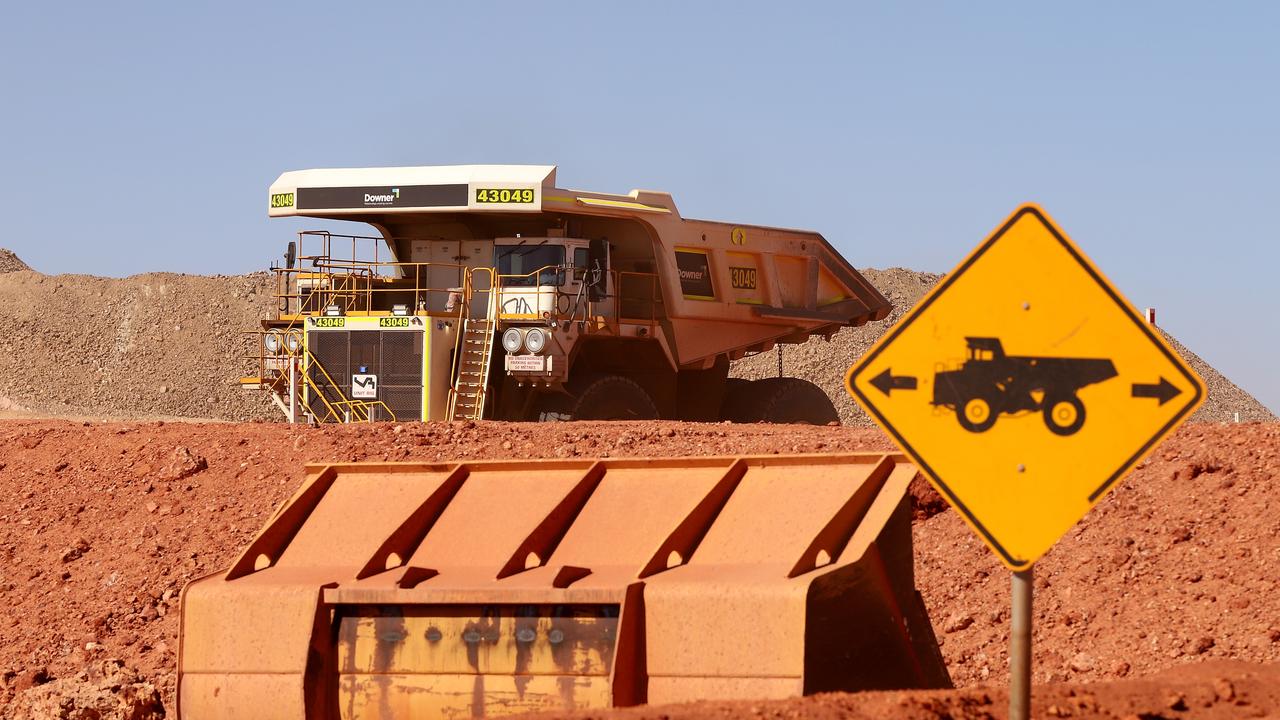Big super’s reality check over Wall Street surge
Global markets remain vulnerable if US interest rate cuts don’t arrive within the next few months and the big Australian super funds are playing it safe.
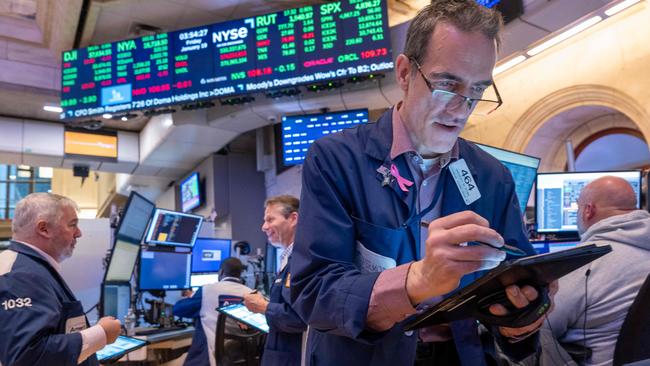
Business
Don't miss out on the headlines from Business. Followed categories will be added to My News.
Global markets remain vulnerable if US interest rate cuts don’t arrive within the next few months, a move that could see a rapid unwinding of the euphoria that has been building into shares.
This means big Australian super funds are weighing up the risks to US equities if inflation there doesn’t cool as expected. An extraordinary rally in the US has pushed Wall Street up nearly 20 per cent in a little over two months, particularly for tech stocks. Even if cash rates start coming down as expected, most of the gains have already been built in to shares.
Damian Graham, the chief investment officer overseeing $165bn in funds in Aware Super is among those who anticipates the powerful US Federal Reserve will start cutting this year, but his outlook comes with a warning.
“The market will be more vulnerable if we don’t see rate cuts occur,” Graham tells The Australian. His expectation is that it is “more likely than not” the US cash rate will start falling from its 5.25 per cent to 5.5 per cent range from the second half of this year, with multiple moves to follow.
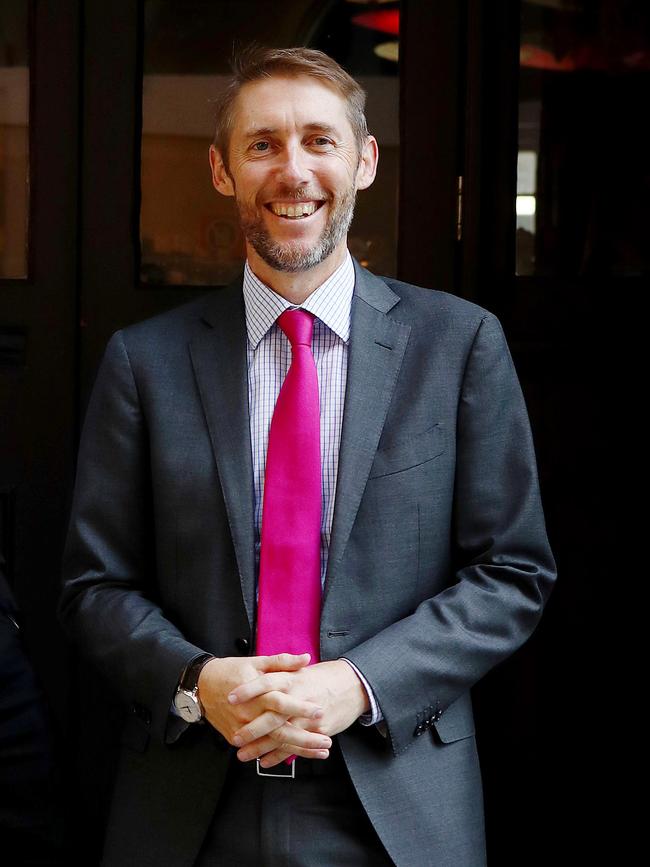
But even in a rate cut situation, Graham is cautious on the outlook for US equities for the near term and is set to divert more of his portfolio into unlisted markets and private credit where the growth outlook is rosier.
Wall Street shares pushed to a record high on Friday. However, the pace of the rally that began late October is clearly running out of steam. US shares surged more than 16 per cent in the last two months, but took three weeks to add another two per cent. Australian shares have had a more downbeat start to the year, given the clouded outlook for China’s economy. The benchmark S&P/ASX 200 index is so far down nearly three per cent. Markets are betting on a rate cut here much later in the year.
However, the prospect of the hard grind of a slowing US economy means there is going to be limited upside for corporate earnings, Graham says. And that counts for Australia too.
“We will continue to take the view that regardless of whether rates get cut early or later in 2024, we still expect to see interest rates stay a bit higher than they have for a while. It may be that true form of lower growth without moving into recession,” Graham tells The Australian.
“Equity markets probably will be a little bit flatter in 2024. But volatility will likely continue as well.”
Aware ranks as the nation’s third-biggest super fund, tracing its membership to NSW’s public sector fund First State Super. Three years ago it merged with VicSuper and WA Super and was renamed through the process.
Aware is widely seen as among the more liquid super funds and remains on the hunt for steady income generating investments. SuperRatings figures released last week showed Aware came inside the top 10 of super fund performance during the past 12 months. Its balanced fund returned 11 per cent. The $100bn Hostplus, which is more leveraged to growth assets including technology and shares, came out on top for the year, with its balanced fund returning 13.2 per cent.
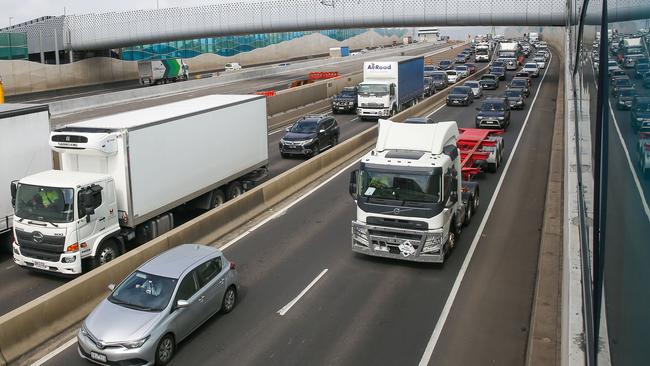
Graham and his team are in the process of stepping up their offshore push, and remains on the lookout for infrastructure, private equity and other unlisted fund investments. Aware opened an office in London in November and is using that as a base to expand through Europe. Around half of Aware’s portfolio is now allocated offshore, although Graham would like to see this move higher. Opportunities will be built around Aware’s big investment themes: decarbonisation, digitisation, and demographics – particularly ageing.
“As we continue to grow, we’re going to need to ensure we’re accessing the broadest universe of opportunities,” he says.
Graham wouldn’t be drawn on how his fund voted in last year’s Origin takeover battle, but says markets need to be prepared for big Australian funds to increasingly flex their muscle.
Brookfield and private equity partner EIG saw their near $19bn bid for Australia’s biggest energy generator stumble after failing to secure support from cornerstone shareholder Australian Super. The $260bn Australian Super had argued the bid significantly undervalued Origin’s longer-term prospects.
“If you think about the dynamics that are at play in the market in Australia, clearly super funds will become larger investors. And that will continue.”
Aware likes to think of itself as an “active investor – not an activist”, he adds. He points out his fund has been involved in several privatisations of its own, including the buyout of the Victorian government motor registry and linking up with Macquarie Infrastructure to acquire telco Vocus Group. Other deals include buying out the agribusiness player ProTen. Graham says more buyout opportunities aligning with Aware’s investment themes have emerged, particularly in the last six months. Some were being considered seriously.
“We’re just trying to make sure that with what’s happening in markets, there’s a margin of safety that you’ve been fairly rewarded for the capital that is being invested,” he says.
Make or break for retail
The coming weeks will represent a make-or-break moment for retail. Expect a swag of trading updates from a broad range of discretionary retail brands taking in the all-important Christmas and Boxing Day sales period. The economy is clearly slowing as interest rate hikes – including the November move – are biting, but take a look at the share price of retailers and there’s a different story.
JB Hi-Fi hit a record high in recent days, so too did Super Retail group.
Super Retail, the name behind brands such as Super Cheap Auto, BCF and Rebel Sports, has already issued its trading update. And while group sales have slowed sharply, the numbers weren’t terrible. Shares in Bunnings and Kmart-owner Wesfarmers are trading at a two-year high and Harvey Norman at a one-year high. Solomon Lew’s Premier Investments recently touched a one-year high, and online homewares play Temple & Webster is at a two-year high. Even shopping mall owner Scentre Group broke $3.00 at the start of January, a level not seen since last March when the cash rate was a full percentage point lower.
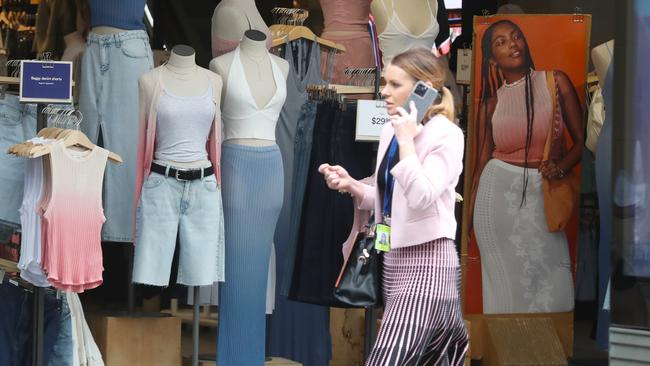
Clearly, investors are betting on rate cuts coming sooner rather than later and with unemployment levels so far holding near record lows, this is expected to keep consumers spending, albeit at a slower pace. Could it be a case of the market getting ahead of itself?
The last week of January represents a period many retailers get a good sense of how sales are tracking and start to update investors. So far Super Retail, Michael Hill and Kathmandu owner KMD Brands have issued their summer trading figures.
Worth watching in the coming two weeks for expected updates are Accent Group, the owner of shoewear chain Athletes Foot, department store major Myer, online player Kogan.com and Mosaic Brands.
JB Hi-Fi is yet to issue its regular January update to investors, although it has so far only given notice for its full year results date. This was seen by many as a sign the electrical goods retailer’s sales are tracking to plan. JB Hi-Fi shares hit a record high of $59.69 in recent days, a remarkable move given the economy is in the process of slowing. The pricing is finely balanced. If the trading updates disappoint, there will be significant investor pain to come.

On Friday, jeweller Michael Hill told of difficult trading conditions in recent months given interest rate rises had been hurting consumer sentiment. Group sales for Michael Hill for the December half were up 4.1 per cent, a clear slowing in momentum from 11.2 per cent growth this time a year ago and a whopping 14.5 per cent a year before that as interest rates were still close to zero. Still, Michael Hill ended the session up 1.1 per cent. That came after its shares recently touched a six-month high.
Super Retail’s group-wide sales of 3 per cent have largely stalled from the 15 per cent growth this time a year ago. However, there are signs of strength in auto and outdoor sales. There’s some way to go in the economic cycle, the economy is slowing but hasn’t cratered on the painful rate hikes.
Even oil refiner Ampol pointed to strong in-store sales at petrol stations as helping to boost better-than-expected sales numbers.
The official December retail sales figures are out on January 30, although some Christmas sales are likely to be now pulled forward to the November Black Friday sales.
More Coverage
Originally published as Big super’s reality check over Wall Street surge





